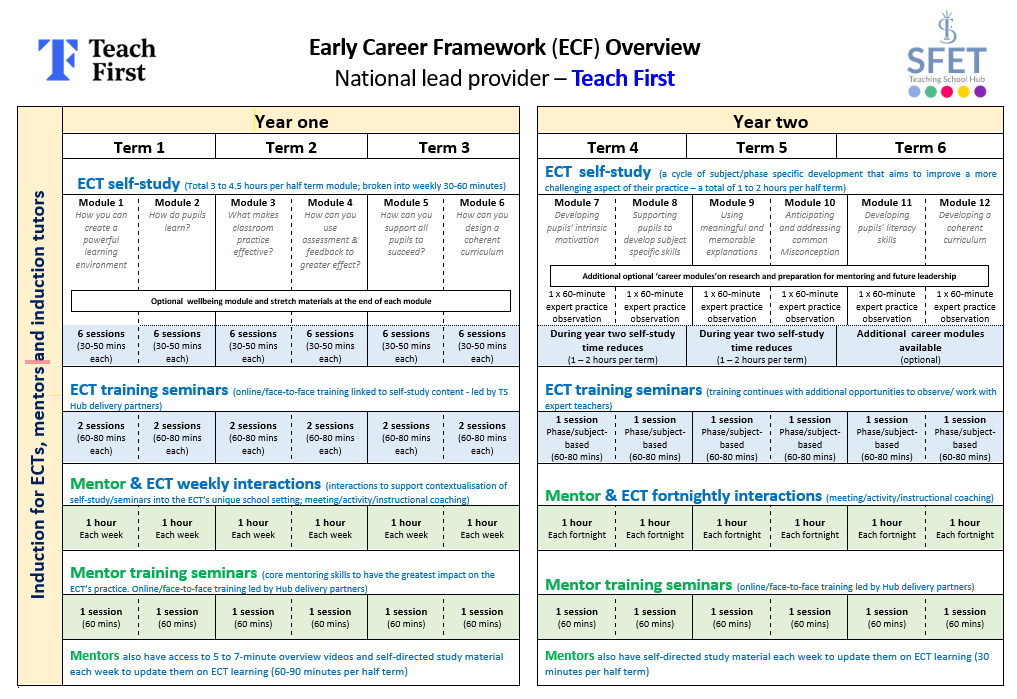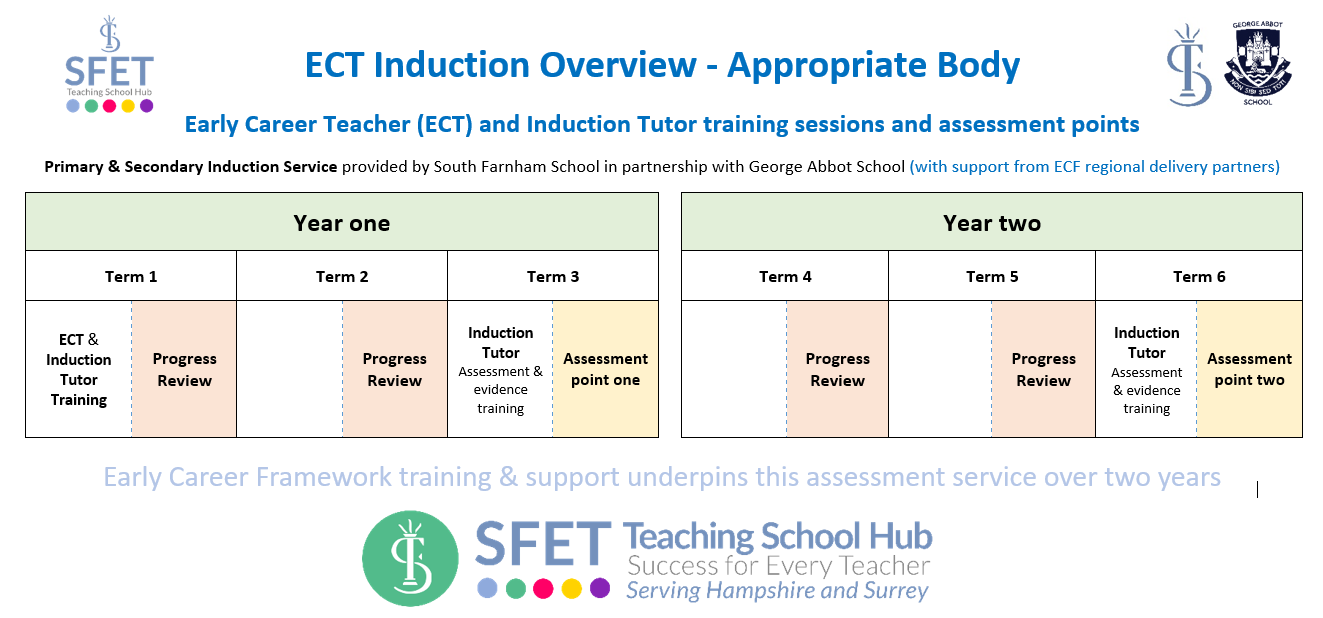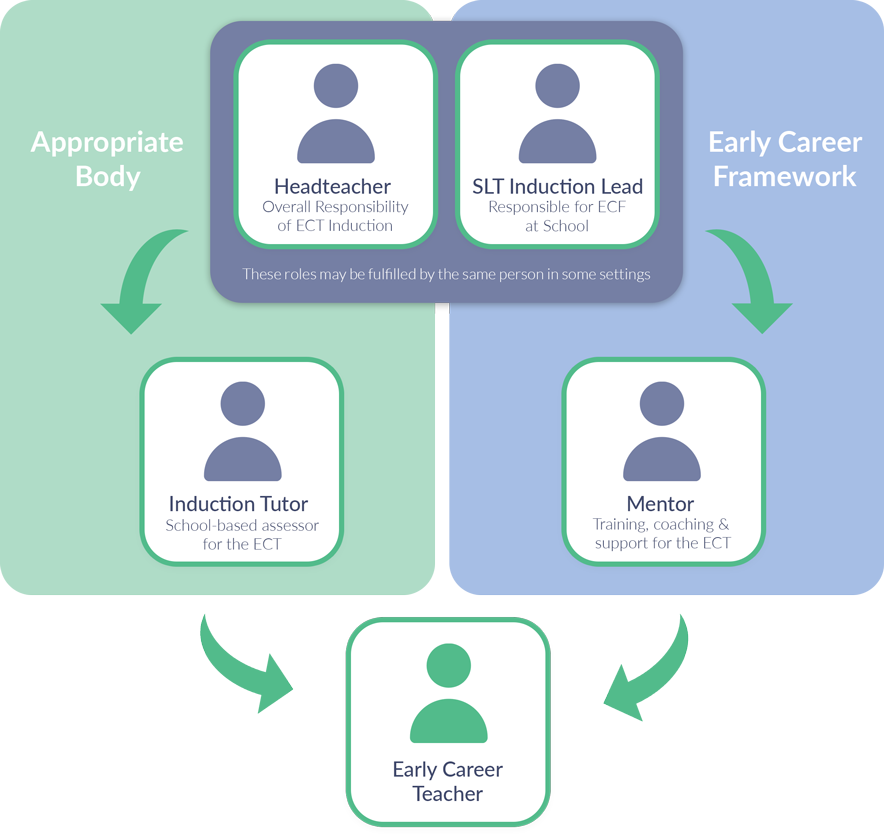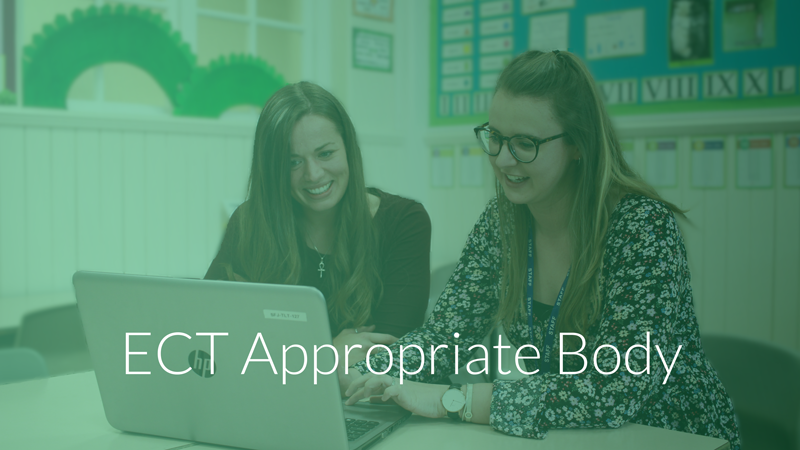- Home
- Early Career Teachers (ECF & Appropriate Body)
- Full Induction Programme (Appropriate Body with ECF)
Full Induction Programme (Appropriate Body with ECF)
The Early Career Framework (ECF) reforms created a step change in support for early career teachers, providing a funded entitlement to a structured two-year package of high-quality professional development.
Our ‘Full Early Career Induction Programme’ incorporates both our Appropriate Body service and Early Career Framework full induction programme (FIP) - £150pa
We would recommend this package as it offers the best value for money and is designed around teacher workload. However, all schools are able to choose their own approach irrespective of working with us as the appropriate body.
Click here to register!
If you choose to sign up for our full induction programme then this offer has not only got the biggest financial benefit to schools but will also lower staff workload with SFET Teaching School Hub coordinating all elements of induction, assessment and training.
We currently support over 600 ECTs and in both primary and secondary schools across Hampshire and Surrey, with more schools joining every year due to our workload friendly programme and focus on efficient use of time for greatest impact on the ECT’s progress and attainment. Our primary and secondary programmes run separately to ensure phase specific training and support.
“The ECF is a game changer in terms early career retention and teacher quality. It represents the most significant reform to teaching in a generation. It embeds a funded entitlement to training and guarantees all early career teachers access to a shared understanding of the best available evidence - akin to the highest performing systems internationally”
Professor Samantha Twiselton, OBE
What does our 'Full Early Career Induction Programme' consist of?
Our ‘Full Early Career Induction Programme’ incorporates both our Appropriate Body service and Early Career Framework full induction programme (FIP) - £150pa
Early Career Framework
- Early Career Framework training for mentors, SLT induction leads and early career teachers (ECTs)
- Online learning platform - a treasure trove of resources, videos, exemplification of practice
- Self-study materials for early career teachers
- Regional expert facilitators - representing outstanding practice from schools across Hampshire and Surrey
- National experts write, shape and present modules
- Primary and secondary delivery teams
- Regional networks for ECTs and their mentors - led by schools across the counties (phase and subject specific)
Appropriate Body
- Registration of your ECTs (previously called NQTs) with the Teacher Regulation Agency (TRA)
- Primary and secondary delivery teams
- Training on assessment processes and induction
- Providing simple and school friendly assessment tools for school induction tutors to use
- Monitoring assessment and progress of ECTs
- Providing support and guidance as necessary -a dedicated team and administrator who will respond on the same day where possible
- Providing advice and guidance regarding the Early Career Framework aspect of induction
- ECT Manager (paperless management system)
- Regional networks for ECTs and their mentors - led by schools across the counties (phase and subject specific)
- Quality assurance - making sure that we are offering the highest possible service
- Access to wealth of training and resources
Let SFET Teaching School Hub support you.
Click here to register!

What are the benefits?
If you choose to sign up for our full induction programme then this offer has not only got the biggest financial benefit to schools but will also lower staff workload with SFET Teaching School Hub coordinating all elements of induction, assessment and training.
Our dedicated delivery and administrative team are on hand all year to respond to any questions you may have.
We understand the induction reforms in their entirety and are well-placed to ensure that your school has everything that it needs.
Our team include primary and secondary practitioners and leaders who understand the demands on staff workload at all levels of the organisation. Training dates and times are carefully considered and resources available online for access at any point.
Streamlined and efficient approach.
No fidelity checks required (schools opting for the core induction or school based programmes will be required to undergo fidelity and quality assurance checks to ensure that the early career teacher entitlement is met in full).
We train over 170 new teachers each year across Hampshire and Surrey and understand their needs as they progress into their first teaching position.
Our team sit on several national advisory bodies (including the Teaching School Hub Council and national ITT Advisory Group) ensuring that the region has a voice at the highest level.
The full induction programme (FIP) is fully funded by the Department for Education. There are no costs to school for the training provided over two years - an incredible offer.
How our Appropriate Body and Early Career Framework programmes fit together
DfE funding for ECF-based training
The full induction programme (FIP) is fully funded by the Department for Education
There are no costs incurred by the school for the training provided over two years which is an incredible offer. The only charge paid by the school is for our Appropriate Body services which comes to £150p/a.
The DfE supports state funded schools with additional funding for ECF-based training. This is paid directly to schools and covers:
Year 1 funding for ECF-based training
Schools receive their core funding through the dedicated schools grant (DSG). The DfE calculate this using the national funding formula (NFF). This funding is primarily based on pupil numbers and characteristics and is allocated by the local authority.
Funding is not ‘earmarked’ for statutory induction. It’s up to headteachers to manage the funding they receive.
Headteachers should use core funding to cover the cost of 10% off timetable for ECTs in year 1 of induction.
Year 2 funding for ECF-based training
DfE pay this funding directly to schools in the summer of year 2. It covers the cost of giving each ECT:
- 5% off timetable for early career teachers (ECTs) in year 2 of induction, for induction activities including ECF-based training and mentor sessions
- a dedicated mentor for each ECT, based on 20 hours of mentoring in year 2 of induction *
We calculate funding using the average hourly rate for mentors and early career teachers, split by region.
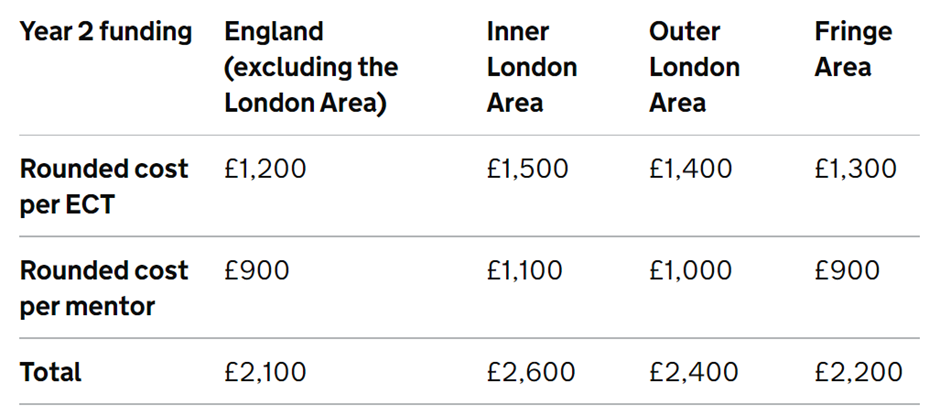
If a school chooses the 'Full Induction Programme' (with SFET providing the ECF training for you) the DfE will also fund:
- 36 hours of mentor time off timetable for training over 2 years, paid directly to schools * (this is for mentor training and is separate to the funding asterisked above which covers mentoring interactions with the ECT)
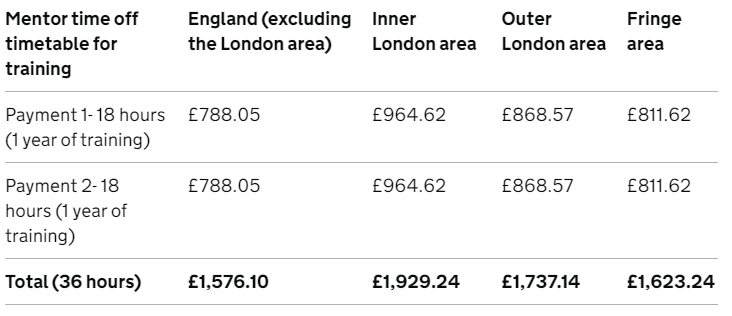
Backfill payments for mentor training (issued July 2022)
In July 2022 the DfE issued a separate guidance document on backfill payments for time off timetable for ECF mentor training.
Schools using SFET to deliver the early career framework (ECF) mentor training will receive backfill payments from the DfE to cover 36 hours of mentor time off-timetable for training per mentor, over two years. This funding will be made in arrears over 2 payments. The first payment will be made in the summer of year 1, following commencement of ECF mentor training, covering 18 hours of mentor time off-timetable for training. The second payment for the remaining 18 hours of mentor time off-timetable will be made in the summer of year 2 where there has been sustained engagement with the mentor training.
Full Funding and eligibility for ECF-based training guidance can be read here.
Let SFET Teaching School Hub support you.

School roles and responsibilities
From September 2021, schools are responsible for ensuring that Early Career Teachers (ECTs) receive a programme of training that allows them to understand and apply the knowledge and skills set out in the Early Career Framework (ECF).
In association with the Appropriate Body, schools are also required to assess ECTs against the Teaching Standards and will ultimately make a recommendation as to whether the ECT has completed the induction satisfactorily.
To download a PDF version of this document, click here.
The Headteacher
The headteacher is, along with the Appropriate Body, jointly responsible for the monitoring, support and assessment of the ECT during induction.
Early Career Framework-based training is expected to be embedded as a central aspect of induction; it is not an additional training programme. The headteacher is expected to ensure that ECTs receive a programme of training that enables the ECT to understand and apply the knowledge and skills set out in each of the ECF evidence (‘learn that’) statements and practice (‘learn how to’) statements.
The headteacher must ensure the induction tutor and mentor has the ability and sufficient time to carry out their role effectively. They are responsible for ensuring the ECT’s progress is reviewed regularly, including through observations of and feedback on their teaching and that assessments are carried out, reports completed and sent to the Appropriate Body. We are very mindful of workload and this should be done in the most streamlined and least burdensome way.
The headteacher is responsible for making a recommendation to the Appropriate Body on whether the ECT’s performance against the Teachers’ Standards is satisfactory or requires an extension at the end of their induction. They should act early, alerting the Appropriate Body when necessary, in cases where an ECT may be at risk of not completing induction satisfactorily.
The Induction Tutor (school assessment)
The headteacher should identify a person to act as the ECT’s induction tutor, to provide regular monitoring, guidance and support, and coordination of professional development and assessment. The induction tutor is expected to hold QTS and have the necessary skills, knowledge and time to work successfully in this role and be able to assess the ECT’s progress against the Teachers’ Standards.
This is a very important element of the induction process and the induction tutor must be given sufficient time to carry out the role effectively and to meet the needs of the ECT. The induction tutor will need to be able to make rigorous and fair judgements about the ECT’s progress in relation to the Teachers’ Standards. They will need to be able to recognise when early action is needed in the case of an ECT who is experiencing difficulties.
It may, in some circumstances, be appropriate for the headteacher to be the induction tutor. The induction tutor is a separate role to that of mentor.
It may, in some circumstances due to size of school or capacity, be necessary for the induction tutor to also act as the mentor
An ECT’s teaching is expected to be observed at regular intervals throughout their induction period to facilitate a fair and effective assessment of the ECT’s teaching practice, conduct and efficiency against the Teachers’ Standards. Observations of the ECT may be undertaken by the induction tutor or another suitable person from inside or outside the institution.
The induction tutor and the ECT must meet to review any teaching that has been observed, with arrangements for post-observation review meetings made in advance. Feedback from the observation should be provided in a prompt manner; it should be constructive, with a brief written record made on each occasion indicating where any development needs have been identified.
The induction tutor is expected to review the ECT’s progress against the Teachers’ Standards throughout the induction period, with progress reviews taking place in each term where a formal assessment is not scheduled. ECTs should have formal assessments carried out by either the headteacher or the induction tutor with input from other colleagues as appropriate (normally one at the end of term three and one at the end of term six, or pro rata for part-time staff). The induction tutor should inform the ECT following progress review meetings of the determination of their progress against the Teachers’ Standards and share progress review records with the ECT, headteacher and Appropriate Body.
The induction tutor should ensure that all monitoring and record keeping is done in the most streamlined and least burdensome way, and that requests for evidence from ECTs do not require new documentation but draw on existing working documents.
Can the Induction Tutor also be the Mentor?
The mentor and the induction tutor are two discrete roles with differing responsibilities and it is expected that these roles should be held by different individuals.
In exceptional circumstances it may be necessary for the headteacher to designate a single teacher to fulfil both roles, which may be the headteacher themselves. Where this is the case the headteacher should ensure that the induction tutor understands that they are fulfilling two discrete roles and that adequate safeguards are put in place to ensure that the mentoring support offered to the ECT is not conflated with assessment of the ECT against the Teachers’ Standards.
Mentors should not carry out formal assessments unless they are also acting as the induction tutor.
The SLT Induction Lead (ECF)
The SLT Induction Lead is essential to the success of the Early Career Framework (could be a role also undertaken by the Headteacher or a colleague with senior responsibilities). Having a supportive senior colleague in school is often the key to success for great teachers.
The SLT Induction lead has responsibility for ensuring the mentor and early career teacher have appropriate timetables to ensure that they can make the most of the programme. The ECT’s weekly self-directed study should be scheduled before the mentor interactions if possible, as these interactions follow on from this work. The ECT will need to attend two training sessions per half-term and you will need to consider this when creating the ECT’s timetable.
ECTs should continue to be registered with an Appropriate Body and will continue to adhere to the specific requirements of the Appropriate Body programme, including assessment requirements.
Whilst the mentor will monitor the progress of the ECT and their self-directed study in their weekly interactions, the SLT Induction lead role has overall responsibility for the success of the early career teacher’s CPD, including ensuring that the mentors and early career teachers engage with the ECF. It is recommended that the SLT Induction Lead carries out quality assurance activities across the year. These could include observation of the weekly interactions between the mentor and early career teacher and joint lesson observations of the early career teacher.
The Mentor (Early Career Framework training, coaching and support)
The mentor has a key role in supporting the ECT during induction and is separate to the role of the induction tutor. They will work collaboratively with the ECT and other colleagues involved in the ECT’s induction within the same school to help ensure the ECT receives a high quality ECF-based induction programme.
Mentors are expected to engage with a series of group webinars and content familiarisation sessions which will be delivered virtually. Mentors are responsible for the delivery of a series of instructional coaching sessions with their Early Career Teachers. Full training will be provided by the Teaching School Hub.
The headteacher should identify a person to act as the ECT’s mentor, to provide regular mentoring. The mentor is expected to hold QTS and have the necessary skills and knowledge to work successfully in this role.
Mentoring is a very important element of the induction process and the mentor is expected to be given adequate time to carry out the role effectively and to meet the needs of the ECT. This includes meeting regularly with the ECT for structured mentor sessions to provide effective targeted feedback and attending mentor training where appropriate. Instructional coaching is a central and critical aspect of the mentoring role – one that can make a big difference to an ECT’s practice.
The Early Career Teacher (ECT)
The ECT is expected to participate fully in their ECF-based induction programme. This will include, meeting with their induction tutor to discuss and agree priorities for their induction and how best to use their reduced timetable allowance to aid their professional development.
The ECT will keep track of and participate effectively in the scheduled classroom observations, progress reviews and formal assessment meetings and provide evidence of their progress against the Teachers’ Standards.
How to register for this outstanding package of support, assessment and training
To register your early career teachers for our full package of support (our Full Early Career Induction Programme) you need to complete our registration form.
DfE School Portal
The DfE require schools to enter information regarding their early career teachers and choice of route on their online portal ('Manage training for early career teachers').
The DfE have sent the portal email invitations to all maintained schools and academies using the email address(es) registered against the schools in GIAS (Get Information About Schools). This is usually an office@, admin@ or head@ email address. Schools can download their entry on GIAS to check that the email address is correct.
If you cannot find the original email invitation then you can visit the following website to regenerate the email: Manage training for early career teachers (education.gov.uk).
Click here for DfE guidance for schools: how to manage ECF-based training
![]() Click here for a step-by-step guide to DfE portal registration.
Click here for a step-by-step guide to DfE portal registration.
Please do not hesitate to get in touch with us if anything is unclear as we can help. Contact us on 01252 986890 or email tshub@sfet.org.uk.
Let SFET Teaching School Hub support you.



